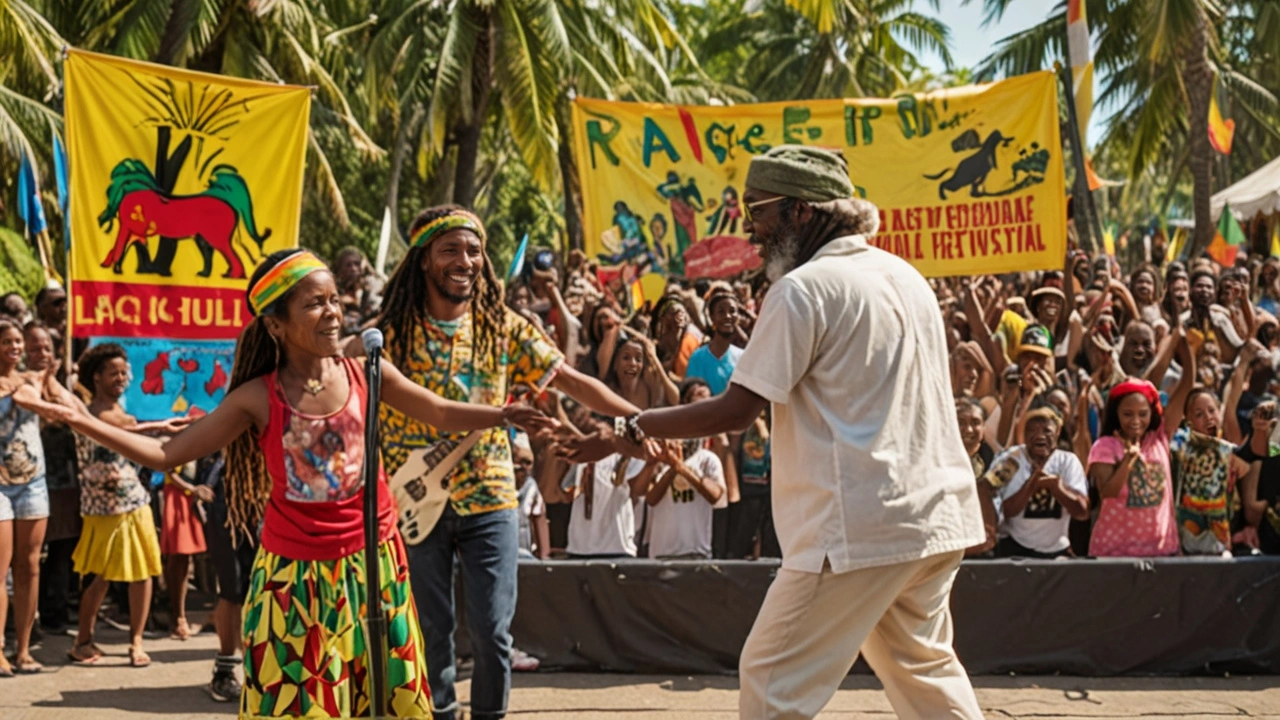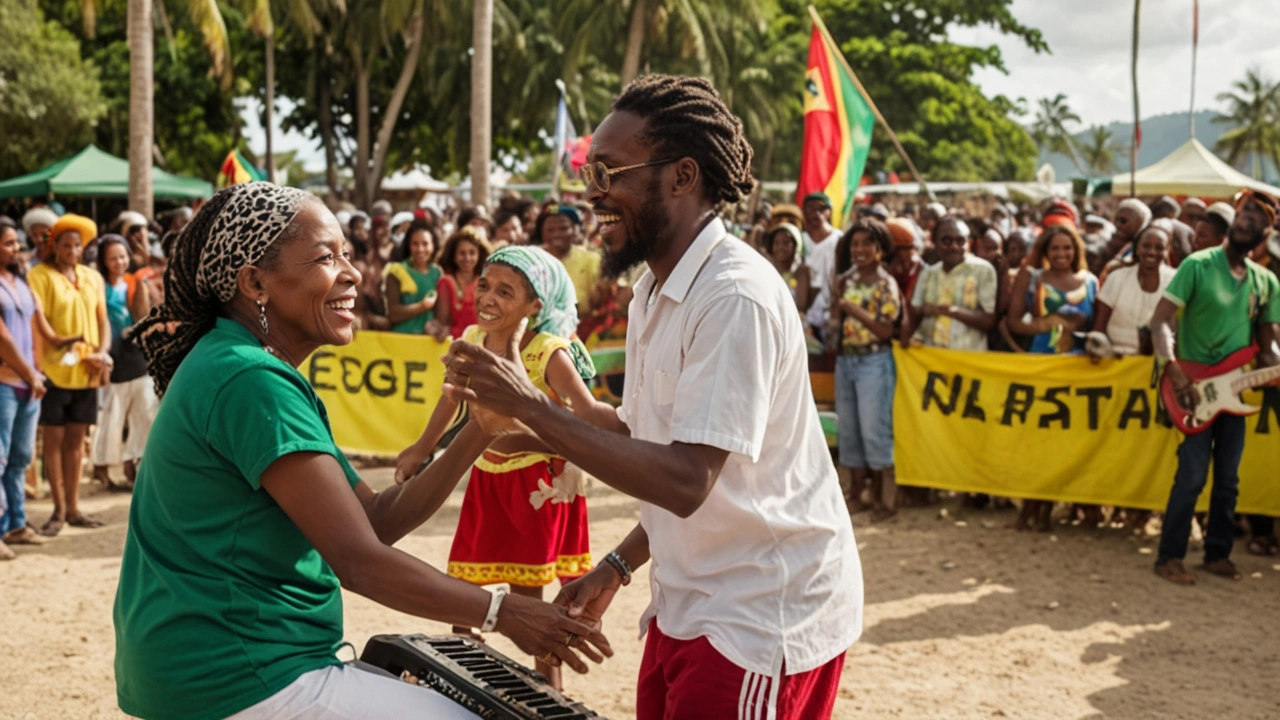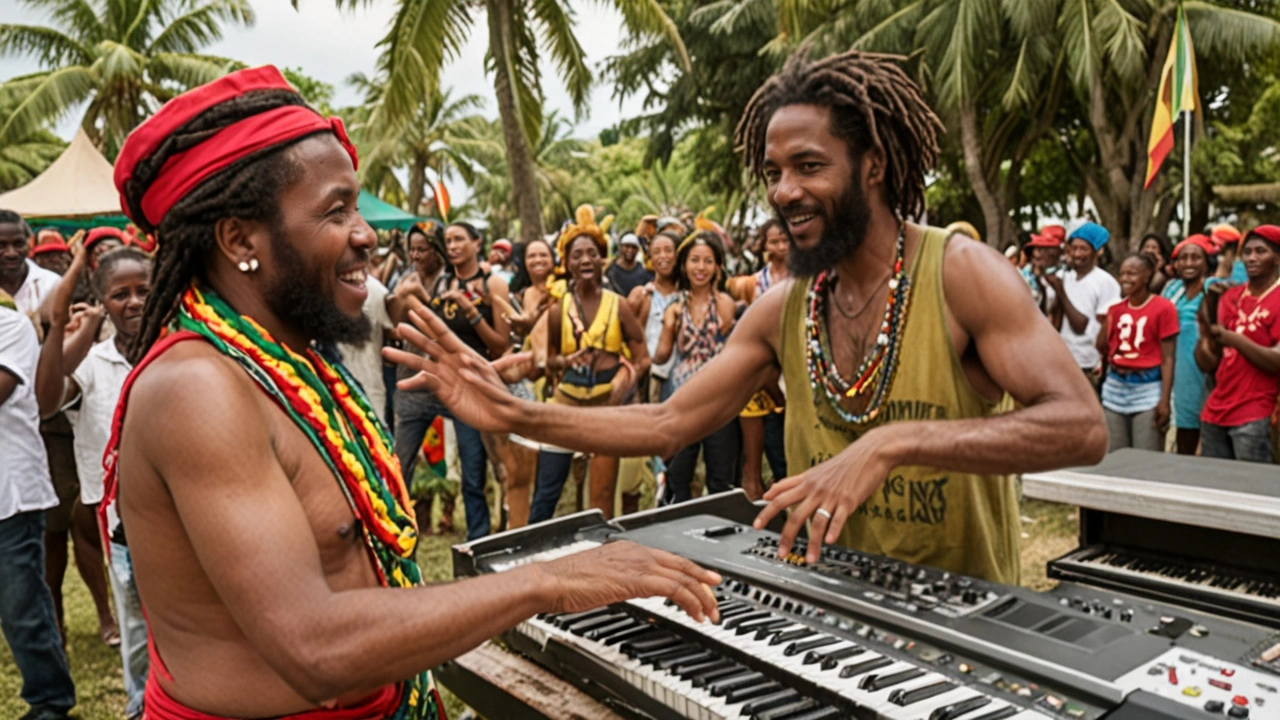Reggae music is more than just a genre; it is a powerful force for love, unity, and protest. What started in the bustling streets of Jamaica has now echoed across the world, breaking barriers and bringing people together. Originally emerging in the late 1960s, reggae carries the soul of the Jamaican spirit, blending African rhythms, jazz, and ska into a unique sound that speaks universally.
One of reggae's most influential champions, Bob Marley, not only brought the genre into the international spotlight but also used his lyrics to address social injustices and spread messages of love and resistance. The harmonious strum of the guitar, the steady heartbeat of the bass, and the soulful croon of the singer create an irresistible call to awareness and unity.
But reggae’s impact goes beyond the music. It has inspired countless social movements, providing a soundtrack for change and revolution. From the anti-apartheid struggle in South Africa to civil rights movements around the globe, reggae has embodied the fight against oppression.
- Origins and History
- Cultural Impact
- Reggae and Social Movements
- Evolution of Reggae
- Influential Reggae Artists
- Tips for Appreciating Reggae Music
Origins and History
Reggae music traces its roots back to the vibrant cultural melting pot of Jamaica in the late 1960s. The genre emerged from the earlier styles of ska and rocksteady, which themselves were influenced by American jazz, rhythm and blues, and traditional African rhythms. Jamaica, having gained independence from Britain in 1962, was boiling with a sense of cultural identity and a desire to express the unique Jamaican experience. It was in this environment that reggae was born, combining soulful melodies with an unmistakable beat that spoke to the heart of both joy and pain.
The term 'reggae' is often said to have been first popularized by Toots and the Maytals in their 1968 hit song "Do the Reggay." This song marked a turning point in the way music was produced and consumed on the island. The name itself has since become synonymous with not just a music genre, but a cultural movement that emphasizes peace, consciousness, and resistance against oppression. As Bob Marley once put it, "One good thing about music, when it hits you, you feel no pain."
Bob Marley's influence cannot be overstated. His rise to fame in the 1970s carried reggae to international audiences and made it a symbol of hope for millions around the world.
Early reggae artists like Jimmy Cliff, Peter Tosh, and Bunny Wailer added their voices to this burgeoning movement, each bringing their own unique perspectives and experiences. Jimmy Cliff's "The Harder They Come" not only became a hit song but also a seminal film that introduced global audiences to the struggles of the Jamaican people. Their music often dealt with themes of social justice, poverty, and the need for change, striking a chord with listeners both in Jamaica and abroad.
It's also important to note the role of sound systems in the rise of reggae. These mobile discos were a cultural phenomenon in Jamaica, where large speakers would be set up in the streets for impromptu dance parties. DJs played a critical role, not only in selecting and playing music but also in creating new tracks and dub versions that added depth and variety to the reggae sound. These sound systems became incubators for new talent and innovation, making them a cornerstone of reggae's development.
By the 1970s, reggae had crossed the Jamaican shores and began to influence music globally. Bands like The Clash in the UK incorporated reggae rhythms into their own punk sound, proving that reggae had a universal appeal. The genre’s powerful messages of love, unity, and resistance resonated with audiences from all walks of life, leading to a global fan base that continues to grow even today. Reggae festivals around the world celebrate this genre, bringing people together to enjoy its infectious rhythms and socially conscious lyrics.
Today, the influence of reggae can be seen in various other musical genres, from hip-hop to pop, and even in electronic music. It is a testament to the genre's enduring legacy and its ability to evolve while still maintaining its roots in the struggles and triumphs of the Jamaican people. As we explore the other sections of this article, we will see that reggae is not just music; it is a way of life, a symbol of resistance, and a universal language of love and unity.
Cultural Impact
Reggae’s cultural influence is as profound as it is far-reaching. From fashion to language, and even political movements, this genre has left an indelible mark on societies across the globe. Emerging from Jamaica's underprivileged sectors, reggae became a voice for the marginalized, offering a platform to address the struggles and hopes of everyday life. Its unifying power reaches beyond borders to touch hearts and minds worldwide.
A key aspect of reggae's cultural impact is its contribution to the Rastafari movement. Reggae and Rastafarianism are nearly inseparable, with reggae serving as a carrier of Rastafarian ideology—promoting peace, love, and resistance against oppression. Symbols like the lion of Judah, dreadlocks, and colors of the Ethiopian flag have become part and parcel of reggae culture. Bob Marley, a devout Rastafarian, once said, "Reggae music becomes a cultural expression for people who might not understand the philosophy, but who innately feel the message of peace and harmony."
The genre's influence extends to language as well. Jamaican Patois—an English-based creole language—is often featured in reggae lyrics. This linguistic style has found its way into mainstream music, films, and even everyday speech in various parts of the world. Words like "irie" (feeling great) and "tings" (things) have crept into global vocabulary, illustrating reggae's cultural penetration.
Reggae's fashion impact is visible through its distinctive style, which often includes dreadlocks, knitted caps, and vibrant, earth-toned clothing. This fashion doesn’t just represent a look but also signifies a lifestyle associated with natural living and spiritual freedom. Such cultural markers have transcended the boundaries of the music itself, permeating youth culture globally.
The genre's social impact is also noteworthy. Reggae has inspired numerous movements advocating for justice and equality. Events like the One Love Peace Concert in 1978, where Bob Marley famously united Jamaican political leaders from opposing factions, showcased reggae's role as a force for societal change. Decades later, artists like Buju Banton and Chronixx continue to use reggae to address contemporary social issues, from systemic racism to environmental sustainability.
Interestingly, reggae has become a global phenomenon with dedicated fan bases in regions as diverse as Africa, Europe, and Japan. Each locale has developed its unique spin on reggae, blending it with local sounds and traditions. This cultural exchange not only spreads the original messages of reggae but also enriches the genre, transforming it into a dynamic, evolving musical form.
Moreover, reggae's zeitgeist can be measured in its influence on other music styles. Genres like hip-hop, punk, and even rock have absorbed elements of reggae. Artists such as The Clash, Sublime, and Lauryn Hill notably incorporated reggae rhythms and themes into their work. This cross-pollination has helped reggae music to maintain its relevancy and continue shaping cultural landscapes across generations.
Reggae's cultural imprint is both historical and ongoing. As new generations discover the genre, its messages of love, unity, and resistance remain as pertinent as ever. Reggae is not just a genre confined to musical notes; it's an ongoing cultural phenomenon that continues to inspire, mold, and uplift. This enduring impact reminds us that music is a powerful tool for change, capable of bridging cultural divides and fostering a collective spirit of humanity.

Reggae and Social Movements
Reggae music has played a significant role in numerous social movements across the globe. Its roots in Jamaica's struggle for independence and its association with the Rastafarian movement have given it a powerful voice that resonates with people fighting against oppression and for social justice. From the very beginning, reggae musicians have sung about the need for change and the fight for equality, offering a soundtrack to various forms of resistance.
One of the most notable examples of reggae's influence in social movements is its role in the fight against apartheid in South Africa. Reggae artists like Peter Tosh and Bob Marley were vocal supporters of the anti-apartheid movement, using their music to spread awareness about the injustices faced by black South Africans. Bob Marley's famous concert in Zimbabwe in 1980, celebrating the country's independence, stands as a testament to reggae's power to inspire and unite.
In the United States, reggae music has been a supportive force for the civil rights movement. Songs like "Get Up, Stand Up" by Bob Marley and The Wailers became anthems for the fight against racial discrimination. The simple yet profound message to stand up for one's rights resonated deeply with those advocating for change, making reggae not just a genre of music but a form of protest.
Reggae has also played a crucial role in advocating for peace and unity worldwide. The United Nations recognized this in 2018 when it added reggae to its list of intangible cultural heritage. UNESCO cited reggae's contribution to international discourse on issues of injustice, resistance, love, and humanity. This acknowledgment underscores the genre's importance and lasting impact on global cultures.
More recently, reggae has been adopted by movements like Black Lives Matter. The genre’s theme of resisting oppression continues to be relevant, and its beats and messages find their way into protests and rallies, fueling the call for justice. Reggae's influence on social and political landscapes worldwide cannot be overstated, and its message of unity and love remains as powerful today as it was decades ago.
As we look at the significance of reggae in these movements, it becomes clear that this genre is more than just music. It is a beacon for change, a symbol of resistance, and a call for unity. To quote Bob Marley, whose words continue to inspire resistance and hope:
"One good thing about music, when it hits you, you feel no pain."This sentiment captures the essence of reggae as a tool for both comforting the oppressed and empowering them to stand and fight for their rights.
Evolution of Reggae
Reggae music has continually evolved, adapting to changing times and influencing numerous other genres. The roots of reggae trace back to the late 1960s in Jamaica, where it emerged from ska and rocksteady. This was a period of cultural revolution for the island nation, gaining independence from British colonial rule. Reggae captured the essence of this newfound freedom, reflecting the struggles and hopes of the Jamaican people.
In the 1970s, reggae began gaining international attention, largely thanks to Bob Marley and The Wailers. Their music transcended borders, addressing themes like love, unity, and rebellion against oppression. This decade also saw the introduction of the **dub** sub-genre, where producers like Lee "Scratch" Perry began remixing existing reggae tracks to create extended instrumental versions with heavy bass and reverb effects. Dub itself became a powerful musical language, influencing everything from hip-hop to electronic music.
By the 1980s, reggae had splintered into various sub-genres. Dancehall and ragga emerged, which were faster-paced and featured more digital instrumentation compared to their predecessors. Artists like Yellowman and Shabba Ranks were pioneers of this style, which resonated with the youth culture of Jamaica and eventually spread globally. Dancehall, with its infectious grooves and assertive lyrics, became particularly influential in the evolution of modern hip-hop and R&B.
The 1990s brought another wave of transformation with the rise of **reggae fusion**, blending elements of reggae with other genres like rock, punk, and even country. Bands like UB40, Shaggy, and No Doubt popularized reggae fusion, making reggae rhythms a mainstay on international charts. This period also saw the rise of conscious reggae artists who used their platform to address social and political issues, in the spirit of Bob Marley.
In recent years, the digital age has revolutionized the distribution and production of reggae music. Artists now collaborate across continents, blending traditional reggae sounds with contemporary styles. Artists like Chronixx and Protoje are frontrunners of the "Reggae Revival" movement, which seeks to reconnect modern audiences with the roots and messages of classic reggae. The global appeal of reggae has never been stronger, with festivals dedicated to the genre popping up in places as diverse as Japan, Germany, and Brazil.
Reggae’s evolution is a testament to its adaptability and enduring relevance. It is a genre that continues to inspire and unify, echoing the call for love and resistance across generations and geographies. As Bob Marley once said, "One good thing about music, when it hits you, you feel no pain."

Influential Reggae Artists
When discussing reggae, it is impossible to overlook the towering figure of Bob Marley. Born Robert Nesta Marley in Nine Mile, Jamaica, in 1945, Marley's rise to stardom came with his band, the Wailers. Marley’s music is known for its profound lyrics and catchy rhythms that seamlessly blend together to promote love, peace, and resistance against oppression. His album, 'Exodus', stayed on the British charts for 56 consecutive weeks, marking him as a central figure in the genre's international expansion.
Peter Tosh, another founding member of the Wailers, also carved out a significant place in reggae history. Known for his fierce stance against political corruption and apartheid, Tosh's music consistently pushed the boundaries of the genre. The anthem 'Get Up, Stand Up', co-written with Marley, remains a timeless call for justice and empowerment. Tosh was awarded a posthumous Grammy Award for Best Reggae Album in 1987 for 'No Nuclear War', highlighting his lasting impact on the music industry.
No discussion on reggae pioneers would be complete without mentioning Jimmy Cliff. His work in the 1972 film 'The Harder They Come' played a crucial role in introducing reggae to a global audience. Songs like 'Many Rivers to Cross' and 'You Can Get It If You Really Want' have become anthems of resilience and hope. Cliff's influence transcends generations, earning him a spot in the Rock and Roll Hall of Fame in 2010.
Often called the 'Crown Prince of Reggae', Dennis Brown was another key figure. With a career spanning over three decades, Brown’s soulful voice and heartfelt performances won him fans worldwide. His hit 'Money in My Pocket' reached the UK Top 40, proving reggae's universal appeal. Brown’s ability to convey powerful emotions through his music has left an indelible mark on the genre.
One can’t ignore the contributions of Bunny Wailer, also a founding member of the Wailers. Bunny, whose real name was Neville O'Riley Livingston, was instrumental in the early development of reggae and its success. His solo career was just as remarkable, with albums like 'Blackheart Man' cementing his legacy. Bunny Wailer received the Grammy Award for Best Reggae Album three times, a testament to his significant influence in the music world.
Burning Spear, born Winston Rodney, is another reggae legend whose work is celebrated globally. Known for his Rastafarian themes and spiritually uplifting music, Burning Spear’s album 'Marcus Garvey' remains one of reggae's most influential works. His dedication to Rastafarian beliefs and cultural heritage continues to inspire new generations of reggae artists and fans alike.
Tips for Appreciating Reggae Music
Becoming a fan of reggae music involves more than just listening to its catchy tunes. It’s about understanding its roots, message, and culture. Let's explore some ways to deepen your appreciation for reggae music. First, consider learning about the history of reggae. Knowing its origins in Jamaica and how it developed from ska and rocksteady can give you a richer context for the sounds you hear. Icons like Bob Marley, Peter Tosh, and Jimmy Cliff are not just musicians; they are storytellers of their time.
Next, pay attention to the lyrics. Reggae songs often carry themes of social justice, love, and resistance. Many reggae artists use their music to highlight issues like poverty, racism, and political oppression. Bob Marley once said, “One good thing about music, when it hits you, you feel no pain.” This highlights the genre's power to address serious issues in a way that resonates with listeners without overwhelming them.
Another tip is to explore different sub-genres within reggae. While roots reggae is the most well-known, other styles like dancehall, dub, and lovers rock offer diverse listening experiences. Dancehall, for example, brings upbeat energy and modern flavor, while dub focuses on remixing and instrumental tracks, revealing the creativity behind reggae’s beats.
Engaging with the culture around reggae can also enrich your understanding. Attend live performances and reggae festivals if you can. These events are often filled with a sense of community and celebration, reflecting the genre’s spirit. Even if you can't attend in person, virtual performances and documentaries can offer a glimpse into this world.
Another way to deepen your appreciation is by learning to play reggae music yourself. The genre’s distinctive guitar rhythms, often called the ‘skank’, and syncopated bass lines can be rewarding to learn. Many reggae songs use simple chord progressions, making it accessible for beginners. Plus, playing music can give you a better ear for the genre’s nuances.
Reading books and watching documentaries about reggae can provide more insights. Works like “No Woman No Cry” by Rita Marley or the documentary “Marley” directed by Kevin Macdonald offer personal stories and historical contexts that bring the music to life. You might also come across lesser-known but impactful artists who have contributed significantly to reggae's legacy.
Lastly, connect with other reggae fans. Whether through online forums, social media groups, or local music clubs, having conversations with others who share your passion can introduce you to new artists and albums you might not have discovered on your own. Sharing experiences and insights can deepen your appreciation and understanding of reggae.
Bob Marley once wisely stated, “Get up, stand up, stand up for your rights. Get up, stand up, don't give up the fight.” These words encapsulate the essence of reggae music as a tool for social change and empowerment.

